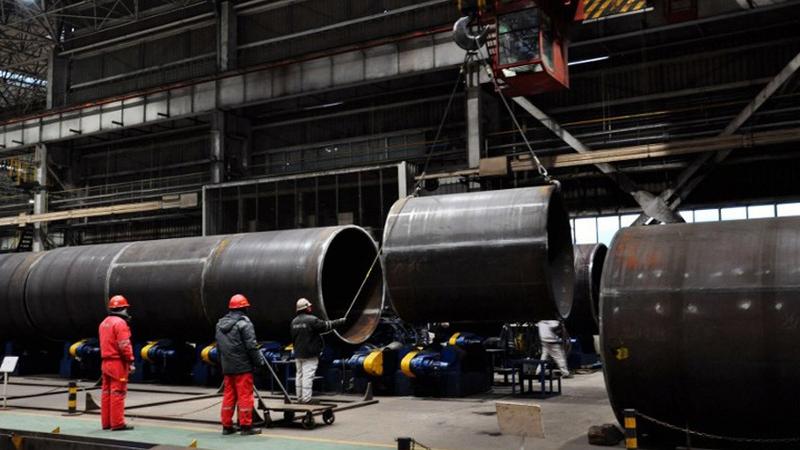Media Report

- The New York Times reports: "China was mentioned only in broad terms when President Trump announced plans to impose tariffs on steel and aluminum imports. But the country was a major driver behind the action. China makes large amounts of steel and aluminum, flooding the global market with cheap products. That hurts American producers, though it makes steel cheaper for everyone who uses it. Targeting China alone wouldn't work. It is the world's largest steel maker, but sends only a tiny fraction of its output to the United States. Chinese steel makers serve mostly Asian markets. Instead, to hit China, the Trump administration must go much broader with its tariffs. While details are scant and the focus could change, the measures would hit steel from countries around the world, including from American allies like South Korea and Canada. The global nature of the tariffs has sparked worries that they will set off a trade war."
- Bloomberg reports: "Chinese President Xi Jinping is preparing to extend a sweeping government overhaul that would give the Communist Party greater control over everything from financial services to manufacturing to entertainment in the world's second-largest economy, two people familiar with the matter said. changes are part of a proposed "CPC leadership system" approved by the party on Feb. 28, the people said. Details of that document, which called for merging more than a dozen state agencies, are due to be revealed by March 17when the National People's Congress -- China's rubber-stamp legislature -- votes on the plan."
- Foreign Policy comments: "Washington on Sept. 24, 2015 on a state visit, hundreds of Chinese students lined the streets for hours, carrying banners and flags to welcome him. It was a remarkable display of seemingly spontaneous patriotism. Except it wasn't entirely spontaneous. The Chinese Embassy paid students to attend and helped organize the event... with Chinese Students and Scholars Associations (CSSAs) at local universities... Although the extent of Chinese government funding and oversight of these organizations is not entirely clear and appears to vary from group to group, it seems to be more significant than previously known... Receiving money from a foreign government or officials isn't illegal, but it could trigger the Foreign Agents Registration Act (FARA), which is designed as a transparency mechanism for organizations attempting to influence American opinion."
Calendar
- 2018-03-06 A stronger China is giving the world ‘more and more security’, Communist Party newspaper says
- 2018-03-05 Chinese Premier’s Economy Speech Offers Plenty for Critics to Dislike
- 2018-03-04 China looks to avoid US trade war as Trump steps up rhetoric
- 2018-03-02 China criticizes US trade report but silent on tariff hikes
- 2018-03-01 Beijing makes it easier for Taiwanese to work and study in China, and Taipei is freaking out over it
- 2018-02-28 China expresses 'strong dissatisfaction' with US duties on Chinese aluminum foil
- 2018-02-27 China's new economic guru is trying to stop a trade war
- 2018-02-26 The 'Quad' Is Not A Rival To China's Belt And Road Initiative -- It's A Precursor
- 2018-02-25 The US risks making a strategic blunder over China
- 2018-02-23 China's big conglomerates are no longer buying up the world
News
- The New York Times The U.S. Wants to Take On China With Trade. The Rest of the World Will Be Caught in the Middle.
- Bloomberg China's Xi to Tighten Communist Party Grip on Economic Life
- The New York Times Talks With North Korea? China Approves (No Matter the Outcome)
- Bloomberg The U.S. Businesses at Risk From Trade War With China
- CNBC China regulator piles more pressure on insurers
- CNBC China 'has the edge' in the war for 5G and the US and Europe could fall behind
- The Wall Street Journal U.S. Soybean Farmers Fear China Will Retaliate for Steel Tariffs
- Daily Beast China's Military Spending Spree Speeds Up
- Financial Times Fonterra's second China foray comes under scrutiny
- Bloomberg Trump's Hardball on Trade to Test China's 'Strategic Composure'
- Axios The scale of the U.S.-China trade deficit
- Bloomberg U.S. Considers Broad Curbs on Chinese Imports, Takeovers
- Quartz China is pushing Africa into debt, says America's top diplomat
Commentary
- Foreign Policy China's Long Arm Reaches Into American Campuses
- PBS Newshour China's growing activity in Africa raises some policy questions
- Financial Times The west is doing its best to help China
- Foreign Policy Washington Strikes Back Against Chinese Investment
- Market Watch China dramatically boosts spending on internal security
- Navy Times China unhappy over US carrier visit to Vietnam
- SFGate Why China's 'Emperor Xi' should worry the US
